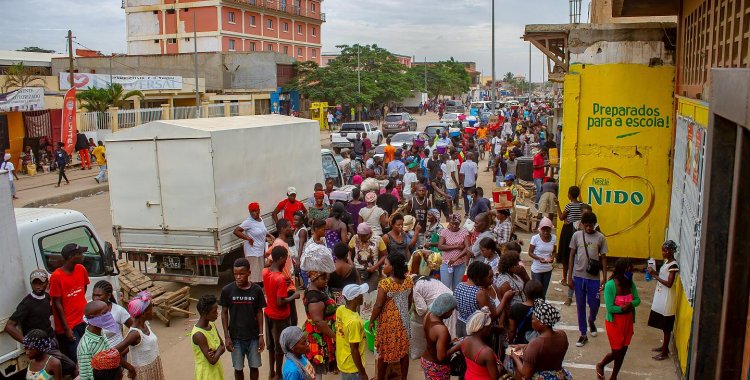Although cloth masks are ubiquitous - not least because no one can ride a transport without protective equipment - disobedience to the rules continues and social distancing is ignored, having become more visible in the third phase of the state of emergency, declared for the first time on March 27 to halt the advancement of the new coronavirus.
On the road that connects Luanda to Cacuaco, the lines for collective taxis are long, people pile up as soon as they see a “blue and white” in the hope of getting in.
Others follow kilometers on foot on the road, where the shuttle starts in the early hours of the day.
Everyone gets a justification for being on the street and the most frequent thing is to do business so as not to die of hunger, as the zungueiras who await the candongueiro claim.
On the opposite side of the road, the chaotic carriageway is filled with cars for at least three kilometers, at one of the various road bottlenecks due to the police barriers that control access to the province of Luanda, where 35 cases of infection with the new coronavirus identified so far.
Along a 22 kilometer route, between the city center and the border with Bengo, Lusa crossed six of these barriers.
With less transport, specific days and times for commerce and street vending to which thousands of Luandans dedicate themselves, maintaining the sanitary fence in Luanda brings added difficulties to those who live or work in border areas.
At the border with Bengo, a few dozen people who want to cross the sanitary fence have to wait several hours until they are allowed to cross the border of Quifangondo.
Paulina Bento Lucas, a bully, says that she arrived at the place at 4 am and still has not managed to leave Luanda because “people are tied”.
He lives in Bengo, but had to go to Luanda to "buy business" that he will try to resell in his province on Tuesday.
He knows that there is a sanitary fence, he knows “about this disease that appeared”, but asks: “How can we do it? If we don't go out and sell the kids, what will they eat? ”.
So he asks that everything return to normal. “We have to pray. Everything has to go back to normal, we will deliver everything to the hand of God ”, he appeals, stressing that“ many are fulfilling the quarantine ”, but they are“ those who already have everything in the ark ”.
“They are the ones who have fish, chicken, everything, we have nothing”, says the saleswoman, explaining that she ends up having to leave home practically every day, because she takes advantage when she cannot sell, an activity that she can only practice now on Tuesdays Fairs, Thursdays and Saturdays, to supply the “business”.
At the barriers, the police are between the indifferent and the indulgent, aware of the difficulties of the citizens, but also of their duty.
They know that they are there to enforce the rules of the presidential decree on the last state of emergency, which despite some concessions, including a 50 percent return to work and opening general trade, with limited hours, still maintains the sanitary fence in the province. from Luanda.
"Only those who have credentials and service passes," says an agent to Lusa, asking for anonymity.
Another admits that "it is difficult to control", lamenting the disobedience of the citizens.
There are those who complain about the excess of obstacles, because even displaying the documents they are forced to wait several hours.
In Panguila, Bengo province, Abel Manuel, a security company supervisor, has been waiting for about three hours to be able to enter Luanda and replace one of the employees.
He explains that due to security breaches, due to conditioning, a church was robbed and all musical instruments were taken.
“We, as security guards, have to go there to intervene, I have been here since 7:00 am, I have a pass, I have a credential. I'm taking too long. When I arrive, I speak with the authority and I wait, time goes by and the man who is at the post gets upset and leaves the post and the crook takes advantage of this situation ”, he says.
Abel Manuel says that “crossing the Quifangondo is very difficult” and the process should be made easier for those who have the documents.
Paulino Soares Maiongo, a taxi driver, criticizes the police for restricting service within the province of Bengo.
“We are prevented from working in the Bengo region, especially in this section, between controlling Roque and controlling Quifangondo. We are unable to work and we don't know why ”, he contests.
“We, who work in the taxi service, had to make it easier for us to work”, he begs, guaranteeing that the taxi is fully booked, which now cannot exceed 50 percent of capacity and has not increased prices, keeping the ticket in 150 kwanzas.
The driver says, vehemently, "No speculation."
As for the reason for “so many people on the street”, the justification is hunger. “I even see ladies going out on foot, with kibbuts (bales) on their backs, made of banana, manioc, bombó, and the policemen still giving clubs to the ladies. This is inhumane what is happening, it is the needs that do this”, he justifies.







